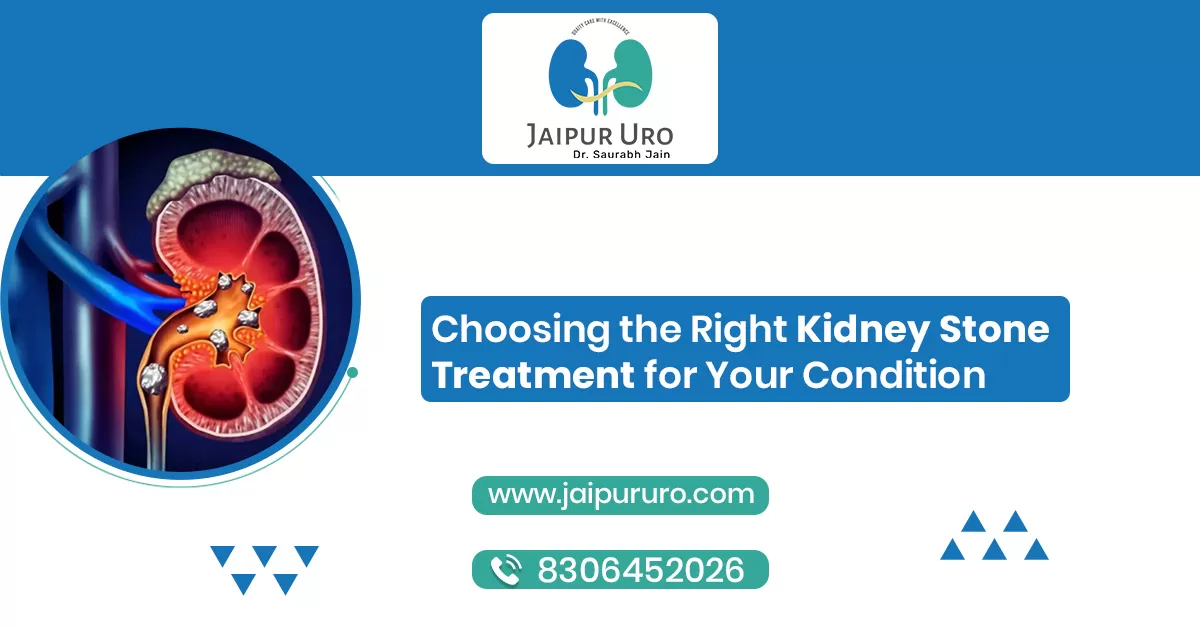
Kidney Stone Treatment Options Explained: Choose the Right One for You
Kidney stones are a common urological problem that can cause intense pain and discomfort. While some stones may pass on their own, others require medical intervention. Choosing the right kidney stone treatment depends on several factors, including the stone’s size, location, type, and the patient’s overall health. Dr Saurabh Jain, one of the Best Urologist in Jaipur, offers expert guidance and advanced treatment options tailored to each patient’s specific needs.
Understanding Kidney Stones
Kidney stones are hard mineral deposits that form inside the kidneys when urine becomes concentrated, allowing minerals to crystallise and stick together. Common types of kidney stones include:
- Calcium stones (most common)
- Uric acid stones
- Struvite stones
- Cystine stones
Symptoms may include severe lower back or abdominal pain, blood in the urine, nausea, vomiting, and frequent urination.
When Is Treatment Necessary?
Not all kidney stones need aggressive treatment. Small stones (less than 5 mm) often pass naturally with increased fluid intake and pain management. However, treatment becomes necessary when:
- The stone is too large to pass on its own
- It causes persistent pain, infection, or bleeding
- It blocks the urinary tract
- Multiple stones are present
- There’s a history of recurring stones
Treatment Options Available
Dr. Saurabh Jain provides a range of modern, minimally invasive treatments. Here’s a look at the most effective kidney stone treatment methods:
1. Medical Therapy
For small stones, medication may help relieve symptoms and assist in stone passage. Alpha-blockers, pain relievers, and medications that adjust urine pH can be prescribed depending on the stone type.
2. Extracorporeal Shock Wave Lithotripsy (ESWL)
This non-invasive procedure uses sound waves to break stones into smaller pieces that can pass more easily. It is effective for stones up to 2 cm and located in the kidney or upper ureter.
3. Ureteroscopy (URS)
In this endoscopic procedure, a thin scope is passed through the urethra and bladder into the ureter to remove or break the stone using a laser. It’s ideal for stones located in the mid or lower ureter.
4. Percutaneous Nephrolithotomy (PCNL)
This is a minimally invasive surgery performed under general anaesthesia. A small incision is made in the back to access and remove large or complex kidney stones directly. PCNL is often recommended for stones larger than 2 cm or when other methods fail.
5. Laparoscopic or Open Surgery
Rarely needed today, traditional surgery is reserved for very large stones or when other treatments are not suitable. Dr. Jain ensures such decisions are made only when necessary.
Personalising Treatment: Why It Matters
Each patient’s condition is unique. Factors like age, kidney function, stone composition, past medical history, and personal preferences play a vital role in selecting the best treatment. Dr. Saurabh Jain emphasises personalised care, ensuring that the chosen treatment aligns with your health profile and goals.
Prevention and Follow-Up
After treatment, preventing recurrence is crucial. Dr. Jain provides detailed dietary and lifestyle guidance based on the type of stone. Regular follow-ups, urine tests, and imaging may be advised to monitor for new stones.
Why Choose Dr. Saurabh Jain?
As a renowned Kidney Transplant Surgeon in Jaipur, Dr. Saurabh Jain brings extensive expertise in treating both simple and complex kidney stone cases. His clinic is equipped with state-of-the-art technology, ensuring patients receive the Best Kidney Stone Treatment in Jaipur with minimal discomfort and quicker recovery.
